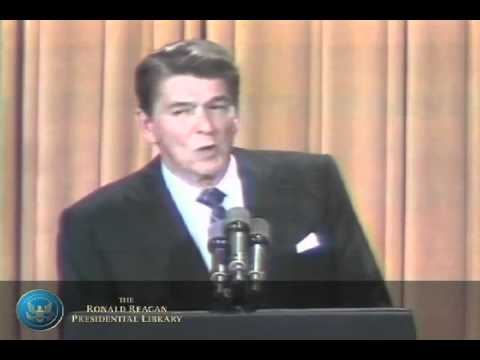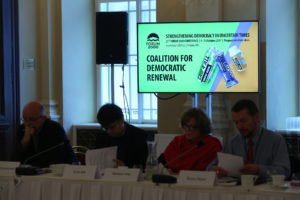
The current global situation is starkly different from the optimistic vision of the inexorable progress of democracy that President Ronald Reagan projected in his celebrated Westminster Address of June 8, 1982, notes the National Endowment for Democracy’s Carl Gershman.
In 2017, democracy advocates from around the world issued “The Prague Appeal for Democratic Renewal” that opens with the dire declaration that “Liberal democracy is under threat, and all who cherish it must come to its defense.” But there are five ways in which the address continues to inspire, instruct, and inform contemporary efforts to renew democracy, he writes for the American Interest:
-

21st Forum 2000 Conference
The first is that the Westminster Address remains the foundational document for efforts to aid democracy internationally. In the part of the speech that is most often quoted, Reagan said, “The objective I propose is quite simple to state: to foster the infrastructure of democracy, the system of a free press, unions, political parties, universities, which allows a people to choose their own way, to develop their own culture, to reconcile their differences through peaceful means.” It’s hard to remember how revolutionary the idea of promoting democracy was in the early 1980s when these words were spoken…
- The second way the Westminster Address continues to inspire and instruct is that it offers a hopeful vision of democracy’s future, something that is especially needed during the present period of democratic recession and pessimism….
- The third way that the Westminster Address can inform contemporary efforts is that it reminds us that even the most formidable authoritarian systems have great and possibly even fatal vulnerabilities. “Any system is inherently unstable,” Reagan said, “that has no peaceful means to legitimize its leaders. In such cases, the very repressiveness of the state ultimately drives people to resist it. . . .”
- The fourth way the Westminster Address can guide us today is that it provides a framework for understanding why democratic political ideas and values must be part of a comprehensive U.S. policy for promoting national security and a stable and peaceful world order…..
- The fifth and final way that way that the Westminster Address can guide us today is that it provides a model of civic nationalism that is essential for the successful defense of liberal democracy in the ideological and geopolitical battle against resurgent authoritarianism….
No democratic leader today speaks with such confidence and conviction about the importance of democracy and human freedom. On the contrary, the United States and other Western  democracies are suffering from a profound crisis of confidence that has three fundamental causes, Gershman (right) adds:
democracies are suffering from a profound crisis of confidence that has three fundamental causes, Gershman (right) adds:
- The first is that democratic leaders and liberal intellectuals have been demoralized by the rise of populist and nationalist movements that have become a powerful and divisive force in many Western countries. …
- The second cause of the crisis of confidence has been the rise of globalization and the bias against the nation-state of the intellectual and professional elites whose thinking dominates global institutions. . …
- The third cause of this crisis is the way the technological revolution and the rise of social media have affected politics in democratic societies….
This is the first in a series of three essays, commissioned by the Ronald Reagan Presidential Foundation and Institute, examining the legacy of Reagan’s Westminster Speech and its relevance for democracy promotion today. Coming Wednesday: a contribution by Daniel Twining. Coming Friday: a contribution by Richard Fontaine.







